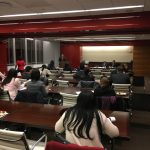On Jan. 13, our Judiciary Committee hosted Bootcamp: Road to the Bench, Part 2 – The Written Application at Seyfarth Shaw.
This workshop provided hands-on advice on how to present yourself and your accomplishments most successfully. Examples of judicial application forms were provided in advance for participants to ask the in-depth questions about the common mistakes and how to avoid them:
- How do you choose your best cases, references, and attributes?
- How do you write the essay or cover letter?
- How do you handle shortcomings?
- How do selection panels view references and who you should choose?
The speakers for the evening included:
Hon. Elizabeth Stong
U.S. Bankruptcy Judge
U.S. Bankruptcy Court for the Eastern District of NY
Hon. Barry Cozier
Vice Chair, Mayor’s Advisory Committee on the Judiciary
Senior Counsel, LeClairRyan
Robert Begleiter
Chair, EDNY Magistrate Judge Selection Panel
Partner, Constantine Cannon
They were moderated by the Honorable Lillian Wan of Kings County Family Court.
The resounding take-away from the panel: The judicial process starts well before the written application. A good, highly qualified judicial candidate is a person who has thoughtfully considered their experience and how it would affect their performance as a judge. A good applicant prepares their references and has been respectful to not only their friends, but also their adversaries. The hardest part of the process, according to Judge Stong, is looking in the mirror and asking whether or not you might be staring back at a judge one day.
Thank you to the panelists for sharing their expertise, James Yu of Seyfarth Shaw for hosting, and the organizers from our Judiciary Committee – Linda Lin, Robert Leung, and David Mou. Thank you to our co-sponsoring organizations: Hispanic National Bar Association (NY Region), Korean American Lawyers Association of Greater New York, and South Asian American Bar Association of New York.
Tonight’s Bootcamp to the Bench event is filled to capacity, but stay tuned for news on the third and fourth events of the series…
— AABANY (@aabany) January 13, 2016
“They’re looking for not just a hard worker or a good lawyer. They want a good person. They want someone who has lived.” #HowToBeAJudge
— AABANY (@aabany) January 13, 2016
The personal statement always helps. #HowToBeAJudge #WrittenApplication
— AABANY (@aabany) January 13, 2016
“The questions don’t make the application. The answers make the judge.” pic.twitter.com/QPSw9kK7WF
— AABANY (@aabany) January 13, 2016
What’s the min. amount of time before you’re a serious magistrate judge candidate? “However long it takes you to make a name for yourself.”
— AABANY (@aabany) January 13, 2016
Sometimes, the conversations with your past adversaries are more telling than the conversations with your references. #HowToBeAJudge
— AABANY (@aabany) January 13, 2016
“We use the interim judicial appointments to really evaluate people.” #HowToBeAJudge
— AABANY (@aabany) January 13, 2016
Diversity has been a consideration and a priority for Mayor de Blasio’s judicial appointments. #HowToBeAJudge
— AABANY (@aabany) January 13, 2016
The most important part of the process begins before you even start the application. Preparation, preparation, preparation… #HowToBeAJudge
— AABANY (@aabany) January 13, 2016
The pitfall of many candidates is that they list people as references without even asking their permission! #HowToBeAJudge
— AABANY (@aabany) January 13, 2016
The most important quality that you can bring to your judicial interviews is candor. #HowToBeAJudge #TellTheTruth
— AABANY (@aabany) January 14, 2016
The personal statement should not regurgitate your résumé. Distinguish yourself. #HowToBeAJudge
— AABANY (@aabany) January 14, 2016
Full house for Judiciary Committee Bootcamp pt 2. Learning a lot about applying to the state and federal bench…. https://t.co/0In4pJXUwV
— AABANY (@aabany) January 14, 2016





